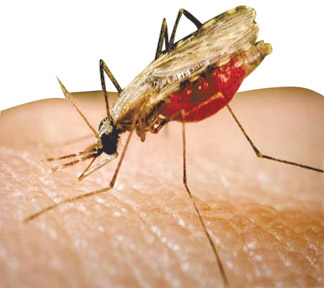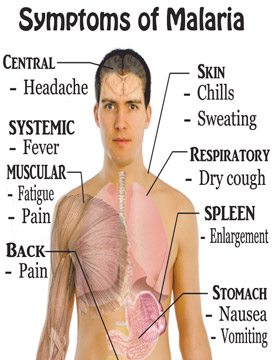The Malaria malaise
Last local case reported in 2012:
by Carol Aloysius
The recent statement by a senior official of the Government Medical
Officers Association (GMOA) has ruffled a few feathers and raised health
concerns - much more than the GMOA official ever expected.The GMOA is
vehement in its stand against getting employees from malaria-ridden
countries to be employed here as it might cause an epidemic.
 Allegations were levelled against the statement by the General
Secretary, GMOA, Dr. Nalinda Herath at a press conference to discuss
health implications of an Indian worker diagnosed with malaria in Nuwara
Eliya early this month, smacked heavily of bigotry, racism and a hidden
personal agenda of the Association. Allegations were levelled against the statement by the General
Secretary, GMOA, Dr. Nalinda Herath at a press conference to discuss
health implications of an Indian worker diagnosed with malaria in Nuwara
Eliya early this month, smacked heavily of bigotry, racism and a hidden
personal agenda of the Association.
Indigenous transmission
GMOA Spokesman Dr Naveen de Zoysa told the Sunday Observer , "What we
said was the truth. After 2012, there have been no cases of indigenous
transmission of malaria in Sri Lanka. But there were cases of locals
being affected with the disease while returning from Africa or India,"
he said.
"However, this case was different. Though this patient had come on a
tourist visa to Sri Lanka, he was working as a carpenter in Nuwara Eliya
for several months, even though his visa had lapsed. These cases are not
rare and should not be taken lightly. Merely because malaria is not
prevalent today in Sri Lanka, if we permit people to come from
epidemic-ridden countries and allow them to stay here freely, then again
another malaria epidemic could break out in this country," he said.
Dr Zoysa said that as early as 2000, Sri Lanka had over 100,000 cases
of malaria. However, in 2012 locally transmitted cases of malaria were
eradicated. "Our doctors and health officials and the Anti Malaria
Campaign (AMC) worked hard to achieve this remarkable result of making
the country free of locally transmitted malaria cases. In fact we hear
the WHO is making arrangements to visit Sri Lanka to give us Malaria
Free Accreditation this year.
We should not let anyone prevent it or destroy what we have achieved
in such a short time. We also said Indians have already commenced
working in our country, even before the proposed ETCA Agreement has been
finalised. As a result, our health status is gradually being dragged
into danger. If ETCA is finalised, the situation will get worse. The
authorities should do something about this in advance," he said.
 |
|
-
dailytodaynews.com |
How, we wondered could signing the ETCA Agreement impact negatively
on our health status. What was the connection?
Responding to our query, he said, " Signing the ETCA Agreement will
open the doors to an influx of migrant workers from malaria endemic
countries. Indian workers comprise the majority of those employed on tea
estates, small-time businesses and construction sites. At present Sri
Lanka is free from the malaria parasite not the vector that transmits
the disease.
ETCA Agreement
If someone carrying the parasite comes here and visits different
parts of the island and if a vector bites him or her, the disease can
spread," he cautioned.
"Signing the ETCA Agreement is the responsibility of advisors, who
are Sri Lankans and have been working for the Indian government since
2002. What we are saying is when ETCA is signed, it will open the doors
for more foreign workers from malaria- ridden countries to come here,
which could expose us to a re-emergence of malaria," he said
The only way to prevent it is to screen every single employee in
their own countries before they come here for employment and to screen
them here as well.
"But how can you do this to thousands of workers who believe they
will get a better deal coming here than working in their own
countries?," he mused.
Violated
Asked about the charge that Dr Herath's statement had violated the
medical Code of Ethics, he said, "President Maithripala Sirisena
recently said economists ignorant of the needs of the masses and with
personal agendas, will be sent home. This statement too can be viewed on
the same lines"
We asked two of the main medical professional organisations to
respond to this charge.
The Sri Lanka Medical Association (SLMA) and the Sri Lanka Medical
Council (SLMC) however, were strangely reluctant to discuss or comment
on the matter, even though they have their own ethics committees.
SLMA sources said no official statement could be made, until the
whole issue and the statement under discussion was studied in depth, and
instead referred us to a book published by the College of General
Practitioners on good family practice, which states that doctors should
not mislead people with wrong information.
The SLMC was equally cautious in its comments. President of the SLMC,
Prof. Carlo Fonseka , who is usually known for his forthright comments,
refused to comment on whether or not the GMOA spokesman had infringed on
the medical code of ethics and promised to take up the matter with the
board later this week.
Anti Malaria Campaign (AMC) sources, however, were much more
forthcoming in their response.
Director AMC, Dr Hemantha Herath told the Sunday Observer that he
agreed with what the GMOA Secretary said. " No. We don't think that what
he said was a violation of the medical code. After all where in the
world is a person with a tourist visa allowed to work as this patient
had done in Nuwara Eliya? Besides being an illegal worker, his visa had
also lapsed which makes it a double 'crime'."
But that does not mean that a foreign worker detected with malaria in
Sri Lanka will be left out in the cold either, he stressed.
"We make sure that an immigrant worker with symptoms of malaria is
treated with the right medication - irrespective of whether he or she is
working illegally or not. Our primary concern is about the person's
health and ensure that they don't spread it to others by giving them
proper treatment."
Asked if such workers should be sent home after they are treated, he
said , "If we resort to such action it will force them to go into
hiding, and infect others. This is not the first time this has happened.
In general, 50 percent of our workers, especially those at construction
sites are foreigners, while the rest are locals who have left the
country to work and returned.
This year, of the 16 malaria-infected patients, only two were found
to be foreigners with malaria.
Fourteen locals who had gone abroad were found to be carrying the
disease from a malaria-infested country. Many of them are unaware of
this fact."He said hundreds of workers were being employed in Sri Lanka.
"This is a huge risk, especially if they are from malaria-endemic
countries. We don't want them to be bitten by mosquitoes and let the
parasite to enter a new victim."
Malaria vector
"We have plenty of malaria vectors here. If a person with the malaria
virus is bitten by one of these mosquitoes, it can get infected. All
mosquitoes are fresh blood feeders.
When they suck the blood of an infected person , they spend a part of
their life cycle in the body of the infected person. A mosquito that
bites such a person and bites someone else can transmit the disease
easily," he said.
When asked what the solution is, he said, "What we need to do is to
create awareness among employees and employers to act responsibly and
screen themselves for malaria, prior to coming here. But that is left to
the employers and employees of those countries. If we interfere there
could be complications,' he said.
The goal of the AMC was to eliminate the malaria parasite so that the
disease would never recur in Sri Lanka. " We have already set up a
national strategic plan for this.
We have blood tests, blood films and also a Rapid Diagnostic Test (RDT)
which gives the results of a blood test immediately.
All it takes is a tiny prick of the finger, and our very sensitive
equipment will do the rest".
"If anyone doubts as to whether he or she has contracted the disease,
then we have the PCRO DNA tests in our own laboratories," he said.
The GMOA had the last word and said "As doctors, we want to save
lives. Another malaria epidemic would wipe out everything we have
achieved, besides thousands of lives would be wiped out, as it did in
the 1930's. Let's not go back to that dreaded past again". |

